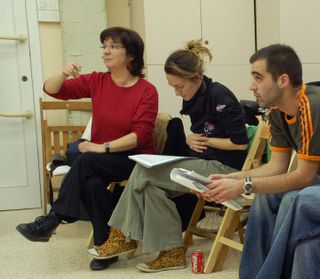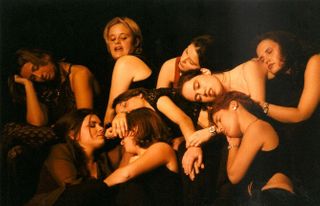- This broad-based University project involves students, alumni and members of the teaching staff and the administration and services staff
- It has always had an experimental calling that has made it open to artistic research
- It has staged one production every year since its inception in the 1993-94 academic year, and there have now been 27 of them
The UVic Theatre Classroom was established in the 1993-1994 academic year as an initiative by the Department of Expressions of the School of Teachers (at what was then Estudis Universitaris de Vic), and was known as the University Experimental Theatre Classroom (ATEU). It was part of the optional subject of Dramatization, which was aimed at addressing the wishes of a group of motivated students who wished to engage in cultural activities outside the academic timetable.
“We chose the word 'classroom' rather than 'group' because we wanted to create a space for learning, understanding, creating and making mistakes, and for experiencing all the connotations of theatre in an open way,” says Dolors Rusiñol, the current director of the Classroom, who has always been at the forefront of all the projects that it has carried out since its inception.

The term “experimental” also constituted a major statement of intent. According to Rusiñol, “our experimental status opened up many avenues for artistic research, and provided the opportunity for us to work simply based on the resources available, without the technical requirements of conventional theatre. The project had modest financial means, which meant that we could not do large-scale productions for both technical and stage design reasons. However, we had a group of people made up of students who although they had little theatrical knowledge contributed a great deal of energy and were very eager to say things through theatre.”
As a result, the Theatre Classroom was established to make artistic creation more accessible to the students, and changed its name as the institution developed, such as when Estudis Universitaris de Vic attained university status. It also fostered the institution's cultural activities and forged close links with other university theatre classrooms, which were at that time present in many of Catalonia's universities.
Medieval beginnings
University theatre has a long history which dates back to the Middle Ages when with general studies, theatre was used within the trivium education system to teach rhetoric, and was an activity that was heavily supervised and regulated by the authorities. Recitations, recitals and literary exercises were customary during religious festivals. We know that the Renaissance saw a return to the Greek and Latin classics, and that students in the Spanish Golden Age had to pass subjects related to the classical languages by performing a Greco-Latin tragedy or comedy.
With the coming of the Second Republic in 1932, Federico García Lorca and Eduardo Ugarte, in the face of the prevailing conservatism on stages at universities and in commercial theatres, called for a radical change in the way theatre was conceived and practised at universities. They founded La Barraca, which created a new type of university theatre company which had cultural, democratising and popular goals.
The Catalan University Theatre (TUC) was established in Catalonia in 1935, and aimed to raise public awareness of the classics and give a voice to the new ideas that were coming from Europe. However, the murder of Lorca and the onset of Francoism led to theatre's domination by National Catholicism, which had a political repertoire that complied with the interests of the regime and specifically prohibited the use of the Catalan language.
TEU (Spanish University Theatre) groups were created from the 1940s onwards, and this led to theatre achieving official status in universities, albeit with a highly regulated and hierarchical structure. It would not be long before dissenting voices called for more openness and better conditions. However, university theatre became a genuine testing ground that became increasingly professional, and many of its leading figures made the transition to independent theatre, which led to a further decline in university theatre to the extent that it almost disappeared. It was not until the 1980s and 1990s, when Spain's new universities opened, that university theatre returned with new groups that had very different objectives to the aims of those during the dictatorship.
One production per year
The UVic Theatre Classroom has staged a production every academic year since its foundation, and the current total is 27. According to Dolors Rusiñol, “this is a dynamic has been sustained over time which I think is worth a great deal of appreciation.” However, it has not always been easy to sustain, “above all because of the limitations and constraints imposed by the constant turnover of students, and the conditions involved in spending time on the Classroom not always being the best,” by which she means the various academic schedules and interruptions that take place during the academic year. Nevertheless, an increasing number of people from various fields related to the University have become members, including teaching staff, administrative and services staff and even former students, and the aim is to become “a broad-based University project.”
The UVic Theatre Classroom has staged a production every academic year since its foundation, and the current total is 27

The Theatre Classroom has not struck out on this path alone, but instead has tried to surround itself with a number of kindred spirits in both the professional and amateur dramatic field, providing a forum for ongoing dialogue between the arts in the various plays it has produced. “This is something typical of theatrical language, but in the Classroom, our cross-disciplinary perspective is particularly apparent thanks to the generous help of many dramatists, musicians and plastic artists who have contributed to the success of our work while working with very limited resources,” says Dolors Rusiñol.
From Chekhov to Aristophanes
The first play that the Theatre Classroom produced was The Good Doctor, by the American playwright Neil Simon, an adaptation of texts by the Russian Anton Chekhov, which were mostly ironic and highly theatrical short stories. “We wanted the play to have plenty of characters so we could give all the members of the group a role, and to give it a comic tone and place it at a reasonable intellectual level,” says Dolors Rusiñol, who was responsible for the choice. Rehearsals began in January 1994, but the play did not première until the following November, after the beginning of the academic year, in the Sala Modernista in the Vic Casino.
From Chekhov to Aristophanes, and from Pere Calders to Sergi Belbel, by way of James Finn and Martine Tartour, many authors have provided the texts that have been the raw material and the sources of inspiration for the Classroom's productions. “Choosing an author or a text has always been difficult, because you never have enough time, as every year you have to wait before you find out who will definitely be participating in the Classroom,” says Rusiñol, “but we try to select something so that everyone can participate and so that each actor is present to the same extent, which means that we have to end up adapting the text to people's characteristics and abilities.”
From Chekhov to Aristophanes, and from Calders to Sergi Belbel, by way of James Finn and Martine Tartour

The play they were beginning to prepare last year, Monotony, by Raquel Garcia, never came to fruition due to COVID-19. “It's a play written by a member of the group, which is made to measure and something we were all involved with. The lockdown meant we couldn't take it any further, but as we were eager to work on it, we made a video imagining how the characters would have grown half a year later. Now we plan to turn it into a film, which at least means that we will be able us to participate in the University Theatre Show that will take place in Alicante,” concludes Dolors Rusiñol.

Eva Marichalar
“I was a member of the first group of students in the Theatre Classroom when I was studying Teaching. I rejoined it ten years after finishing my studies, first as an actor and then as an assistant director. I even started the subject associated with the Theatre Classroom, and I was co-director with Dolors for many years, until I became sole director in the 2009-2010 academic year. You could say that the Theatre Classroom and Dolors were my gateways to the performing arts. Having the opportunity to direct allowed me to develop my language and explore street arts and theatre in unconventional spaces that are now the subject of my doctoral thesis.”

Raquel Garcia
“The UVic Theatre Classroom is an inclusive space where we can all learn to express what we feel and what the characters we are playing feel and do, based on respect and enjoyment. Being a part of the Classroom means feeling that you are part of a big family and that using the theatre, you open up to the world and enjoy inexpressible moments that fill you with energy in your everyday life.”

Bernat Mestre
“While I was studying Physical Activity and Sports Sciences in 2004, I had the opportunity to do the subject of Corporal Expression with Dolors Rusiñol and it fascinated me. She soon convinced me to do the introductory course in theatre with Eva Marichalar, and then I became a full member of the Theatre Classroom.
I must say that the Theatre Classroom has literally changed my life because it provided a connection to my true passion, which was to do theatre, which at that time I knew nothing about. It was four years of personal growth, laughter, work and camaraderie ... and now I've been an actor for ten years. I've been to several training academies that have enabled me to specialise in musicals, although I also do text-based theatre, television and I have my own company. When I look back, I think of the Theatre Classroom as my first home. Thank you Dolors and Eva for being there and improving me. Thank you always for the Theatre Workshop!”
Theatre Classroom premières
1994: The good doctor, by Neil Simon, an adaptation of texts by Anton Chekhov
1995: Coses aparentment intranscendents [Seemingly insignificant things], by Pere Calders and script by David Plana
1996: Tretze Faltes [Thirteen errors], by David Plana
1997: Politically correct bedtime stories, by James Finn
1998: Software, by Pere Sagristà
1999: Embarassadíssimes en el món de les comoditats [Heavily pregnant in the world of comforts], by Martine Tartour.
2000: Lysistrata, by Aristophanes
2001: N’hi ha més a fora que a dins [There are more outside than inside], by Roland Dubillard
2002: Cròniques de dies sencers i de nits senceres, [Stories of whole days and whole nights] by Xavier Durringer
2003: Love letters, by Albert Gurney
2004: Morir [Dying], by Sergi Belbel
2005: Ell(e)s [Them], a play by the Theatre Classroom, based on texts by Sergi Belbel and Pere Sagristà
2006: Divendres 84 [Friday 84], a collective production
2007: Futur perfecte [Future perfect], by Ignasi Garcia Barba
2008: La invasió dels lladres de temps [The invasion of the time thieves], based on the novel Momo by Michael Ende
2009: Steve McQueen, by Gerard Guix
2010: Pere, by Pere Calders
2011: Dona’m la mà [Give me your hand], by Joan Salvat Papasseit
2012: Deriva Mussol, a collective production
2013: The little prince, by Saint-Exupéry
2014: Cada dia importa [Every day matters], a collective production
2015: Marat/Sade, by Peter Weiss
2016: The freedom of crocodiles, by Friedrich von Borries
2017: A l'amor dels botxins [To the love of executioners], by Raúl Hernàndez Garrido
2018: Embolica que fa... Amor! [A messy business which makes ... Love!], by Francesc Pereira
2019: Desmuntant la revolta [Dismantling the revolt], by Sadurní Vergés
2020: Monotonia [Monotony], by Raquel Garcia (not staged)